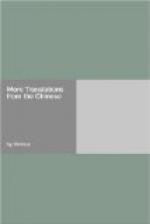In old days those who went
to fight
In three years had one year’s
leave.
But in this war the
soldiers are never changed;
They must go on fighting till
they die on the battle-field.
I thought of you, so weak
and indolent,
Hopelessly trying to learn
to march and drill.
That a young man should ever
come home again
Seemed about as likely as
that the sky should fall.
Since I got the news that
you were coming back,
Twice I have mounted to the
high hall of your home.
I found your brother mending
your horse’s stall;
I found your mother sewing
your new clothes.
I am half afraid; perhaps
it is not true;
Yet I never weary of watching
for you on the road.
Each day I go out at the City
Gate
With a flask of wine, lest
you should come thirsty.
Oh that I could shrink the
surface of the World,
So that suddenly I might find
you standing at my side.
[67] THE SOUTH
In the southern land many
birds sing;
Of towns and cities half are
unwalled.
The country markets are thronged
by wild tribes;
The mountain-villages bear
river-names.
Poisonous mists rise from
the damp sands;
Strange fires gleam through
the night-rain.
And none passes but the lonely
fisher of pearls.
Year by year on his way to
the South Sea.
OU-YANG HSIU
[b. 1007; d. 1072]
[68] AUTUMN
Master Ou-yang was reading his books[1] at night when he heard a strange sound coming from the north-west. He paused and listened intently, saying to himself: “How strange, how strange!” First there was a pattering and rustling; but suddenly this broke into a great churning and crashing, like the noise of waves that wake the traveller at night, when wind and rain suddenly come; and where they lash the ship, there is a jangling and clanging as of metal against metal.
[1] The poem was written in 1052, when Ou-yang was finishing his “New History of the T`ang Dynasty.”
Or again, like the sound of soldiers going to battle, who march swiftly with their gags[2] between their teeth, when the captain’s voice cannot be heard, but only the tramp of horses and men moving.
[2] Pieces of wood put in their mouths to prevent their talking.
I called to my boy, bidding him go out and see what noise this could be. The boy said: “The moon and stars are shining; the Milky Way glitters in the sky. Nowhere is there any noise of men. The noise must be in the trees.”




